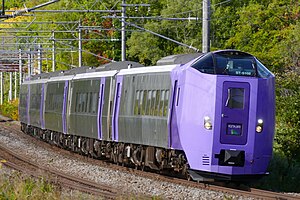This article needs to be updated. (March 2017) |
The Sōya (宗谷) is a limited express train service between Sapporo and Wakkanai in Hokkaido, which is operated by Hokkaido Railway Company (JR Hokkaido). It was named Super Sōya (スーパー宗谷) between 2000 and 2017.
 KiHa 261 series DMU on a Sōya service, September 2021 | |
| Overview | |
|---|---|
| Service type | Limited express |
| Status | Operational |
| Locale | Hokkaido |
| First service | 11 March 2000 |
| Current operator(s) | JR Hokkaido |
| Route | |
| Termini | Sapporo Wakkanai |
| Stops | 17 |
| Distance travelled | 396.2 km (246.2 mi) |
| Average journey time | 5 hours 10 minutes |
| Service frequency | One return service daily |
| Line(s) used | Hakodate Main Line, Sōya Main Line |
| On-board services | |
| Class(es) | Standard + Green |
| Disabled access | Yes |
| Sleeping arrangements | None |
| Catering facilities | None |
| Observation facilities | None |
| Entertainment facilities | None |
| Other facilities | Toilets |
| Technical | |
| Rolling stock | KiHa 261 series DMUs |
| Track gauge | 1,067 mm (3 ft 6 in) |
| Electrification | None |
| Operating speed | 120 km/h (75 mph) |
| Track owner(s) | JR Hokkaido |
Service pattern
editThere is only one single daily return working per direction, with an average journey time between Sapporo and Wakkanai lasting approximately 5 hours 10 minutes. Trains operate at a maximum speed of 120 kilometers per hour (75 mph).[1]
The train operates over the same route as the Sarobetsu, which operates between Asahikawa and Wakkanai.[2]
Station stops
editThe service calls at the following stations:
Sapporo – Iwamizawa – (Bibai) – (Sunagawa) – Takikawa – Fukagawa – Asahikawa – Wassamu – Shibetsu – Nayoro – Bifuka – Otoineppu – Teshio-Nakagawa – Horonobe – Toyotomi – Minami-Wakkanai – Wakkanai
The stations in the () are only served by the northbound service.
Rolling stock
editServices are normally formed of 4-car KiHa 261 series DMUs, which were introduced from the start of services on 11 March 2000, with car 1 at the Wakkanai end. Car 1 consists of both ordinary-class seats and the Green Car, while the other cars are ordinary-class cars. All cars are no-smoking.[3][4] These are lengthened to 6 cars during busy seasons.
| Car No. | 1 | 2 | 3 | 4 | |
|---|---|---|---|---|---|
| Class | Green car | Reserved | Reserved | Reserved | Non-reserved |
| Facilities | Toilets | Wheelchair-accessible toilet | |||
References
edit- ^ "平成26年3月ダイヤ改正について" (PDF) (Press release) (in Japanese). 北海道旅客鉄道. 20 December 2013. Archived from the original (PDF) on 24 December 2013. Retrieved 24 December 2013.
- ^ JR Timetable, August 2008 issue
- ^ Haraguchi, Takayuki (2009). Encyclopedia of JR's Railway Cars: JR全車輌. Japan: Sekai Bunka. p. 115. ISBN 978-4-418-09905-4.
- ^ JR新幹線&特急列車ファイル [JR Shinkansen & Limited Express Train File]. Japan: Kōtsū Shimbun. 2008. ISBN 978-4-330-00608-6.
External links
edit- Super Sōya information on JR Hokkaido official website (in Japanese)